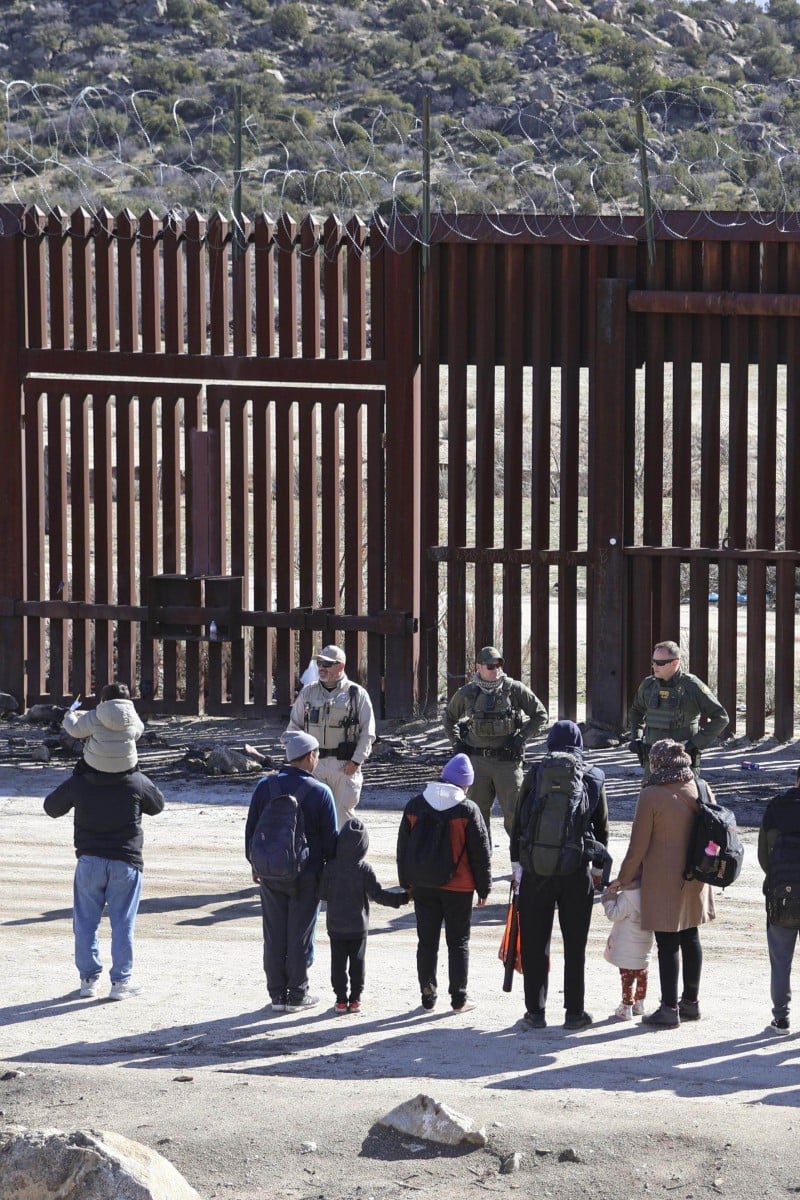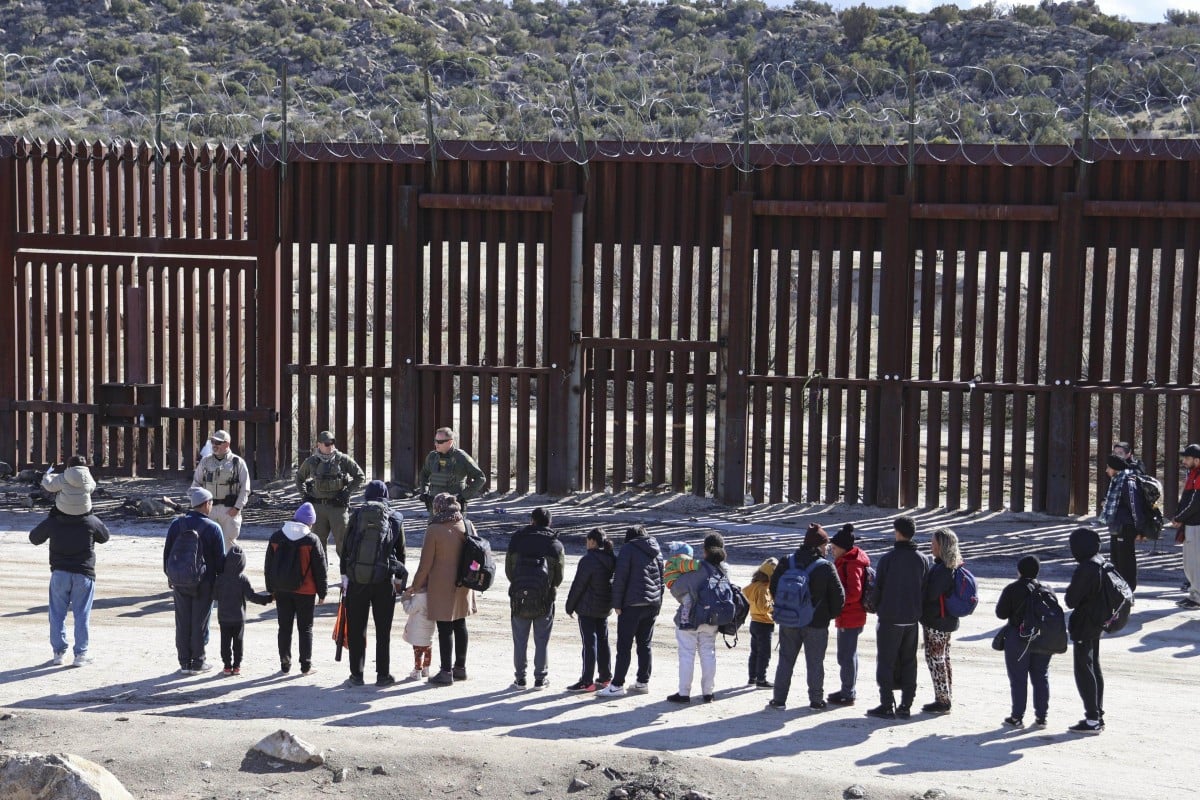
Deep Dive: Undocumented Chinese migrants in the US fear Donald Trump’s deportation threats
President-elect has said he could use the military or declare a national emergency to enact plans to kick out millions of migrants.
 Undocumented migrants from China stand in front of the US-Mexico border in Jacumba Hot Springs, California. Photo: Kyodo
Undocumented migrants from China stand in front of the US-Mexico border in Jacumba Hot Springs, California. Photo: KyodoDeep Dive delves into hot issues in Hong Kong and mainland China. Our easy-to-read articles provide context to grasp what’s happening, while our questions help you craft informed responses. Check sample answers at the end of the page.
News: Donald Trump’s deportation plans scare many undocumented Chinese migrants
-
Trump made immigration policy a key message in his 2024 presidential election campaign
-
Worker at a non-profit group for Chinese immigrants warned against overreacting
US president-elect Donald Trump has long said he has plans to deport undocumented migrants from the country. It has caused fear among Chinese migrants.
“Once Trump gets in office, he’ll kick all of us out,” a person wrote in a group chat.
Some Chinese migrants have written a letter saying they will obey US laws and give back to the country. It began to spread soon after Trump won the election.
Waves of Chinese have been migrating to America in search of new opportunities in recent years. Many say they are leaving China to find more freedom and financial stability in an era when China’s economy has slowed and youth unemployment rates are up.
Trump said he planned to use the US military to deport undocumented migrants.
Stephen Miller is his immigration policy adviser. He has said that “vast holding facilities” will serve as “staging centres” for the operation. In November, the state of Texas offered the federal government more than 1,000 acres near the southern US border to host detention centres.
Deep Dive: China prepares for possible tariff hike under Donald Trump
Trump made immigration policy a key message of his 2024 election campaign. He often described migrant groups in a polarising way. He claimed that Chinese people who entered the US through the southern border were building a secret army.
Earlier in November, NBC News reported that Chinese migrants of military age could be among the first targeted by Trump. He vowed to launch his plan on “day one”.
However, Trump’s deportation plans are likely to face big challenges. Its success will also depend on cooperation with China. China does not seem eager to bring these migrants back to their own country.
“My message to the [migrant] community is to get prepared but not overreact,” said Jose Ng of Chinese for Affirmative Action. It is a non-profit group based in California that supports Chinese immigrants.
Ng said that many “undocumented” Chinese were unlikely to be removed right away. They usually have pending cases in US courts or may qualify for certain types of legal help.
“Undocumented” refers to those who plan to stay in the US but do not have permanent legal status. The word may be used for someone who stayed longer than their visa allowed or entered the country without government permission. Many have lived in the US for decades, and most are not criminals.
According to the Migration Policy Institute, about 241,000 undocumented Chinese people were living in the US in 2021. That was before America saw a surge of more than 60,000 Chinese migrants crossing its southern border without proper documentation between January 2023 and November 2024.
Staff writers
Question prompts
1. Based on the information in News, which of the following is true?
(1) There were around 241,000 undocumented Chinese migrants living in the US this past year.
(2) Around 60,000 undocumented Chinese migrants crossed the US northern border from January 2023 to November 2024.
(3) President-elect Trump focused on immigration policy during his 2024 presidential campaign.
(4) Trump has said that Chinese people are trying to create a secret army in the US.
A. (1), (2) only
B. (1), (3) only
C. (2), (4) only
D. (3), (4) only
2. Using News, list TWO measures the Trump administration might start that would affect undocumented immigrants.
3. How have Chinese migrants in the US reacted to Trump’s win? Explain using News.
Cartoon
1. Who is the person shown in this cartoon? What are they doing to the china?
2. What might the meaning of the cartoon be, and how is it related to the information in News?
Issue: Beijing unlikely to cooperate with Trump in deportation scheme, observers say
-
Friction over trade and human rights means China is unlikely to work with the US to repatriate citizens
-
Chinese nationals who return to the country may face social and legal backlash, sources say
As the world prepares for Donald Trump’s second term, observers say there are signs that Beijing may be less eager to cooperate with the incoming US president this time around, especially when it comes to repatriating Chinese citizens deported from the US.
“Friction over trade or human rights could well lead China to press pause on cooperation with the incoming Trump administration on migrants,” said Thomas Kellogg of the Centre for Asian Law at Georgetown University.
Although not strictly required for deportations, China does not have a formal deportation or extradition agreement with the US. For Chinese nationals to be repatriated, US authorities must provide their personal details to the Chinese embassy or consulates.
The information is then forwarded to China’s Ministry of Public Security, which tasks local authorities in the migrants’ hometowns with verifying their identities – an effort that may prove unsuccessful.
Many Chinese migrants in the US will not have valid passports or other travel documents that Immigration and Customs Enforcement (ICE) requires for removal, according to Sin Yen Ling, a former defence lawyer with 20 years of experience.
US non-profit groups also say there are not enough resources to support undocumented migrants, including skilled immigration lawyers with language proficiency.
Without competent lawyers, the likelihood of losing a court case increases. Chinese migrants who don’t speak English may not be aware of their full rights, risking removal despite being legally entitled to stay.
New migrant children in Hong Kong struggle to learn Cantonese and English
For Chinese nationals who do return, the future looks bleak. According to Chinese sources, these individuals could face a three-year ban on applying for a new passport, inclusion on immigration blacklists and intense monitoring by local police and district officials.
China’s Exit and Entry Administration Law could require them to pay fines or face prosecution based on the methods they used to leave the country and whether they played a role in smuggling others.
Sources said that deportees’ social credit would also likely be deducted, and their children could encounter problems when applying for government jobs requiring political and background screening.
There could also be backlash awaiting some migrants from people at home.
“Please do not send them back to China; we don’t want trash,” said The Upright Brother Lei, a blogger, after the US announced its third deportation flight to China last year.
For some still in the US, the fear of deportation has already come and gone.
“All we can do at this point is abide by the law, prepare our asylum cases diligently and focus on living well,” said Iris Zhao, who overstayed her tourist visa and whose brother and mother crossed the southern US border. “If, unfortunately, we are deported, we can only accept it as fate.”
Staff writers
Question prompts
1. Based on the information in Issue, which of the following is true?
(1) All undocumented Chinese migrants face immediate deportation.
(2) Skilled immigration lawyers with proficiency in Chinese are crucial to helping migrants.
(3) ICE does not need to see travel documents or passports to deport undocumented Chinese migrants.
(4) Some Chinese migrants who return to China may have to pay fines.
A. (1), (2) only
B. (2), (3) only
C. (2), (4) only
D. (1), (4) only
2. Using Issue, name TWO challenges the US government might have with China in regards to repatriating Chinese migrants.
3. What obstacles could Chinese migrants face if they returned to China?
Photo
1. What might be happening in this photo? Describe it using News, Issue and Glossary.
2. Based on Photo and Issue, how does the US’ southern border relate to Chinese immigration?
Glossary
-
deport: the process in which a government removes a foreign national from its country. This can happen when someone violates immigration laws, overstays a visa, or enters the country without the proper documents.
-
polarising: to cause people or opinions to be divided into two opposing groups
-
repatriate: to send a person back to the country they came from
-
Ministry of Public Security: China’s government ministry overseeing public and political security. It has nearly two million law enforcement officers and looks to prevent criminal activity, fight terrorism, maintain social order, manage public gatherings and issue identification cards.
-
Immigration and Customs Enforcement (ICE): Created in 2003, this is a federal law enforcement agency in the US under the Department of Homeland Security. ICE aims to protect the US from cross-border crime and other threats to national security.
-
Exit and Entry Administration Law: a law in China that went into effect in 2013 to regulate the exit and entry of Chinese citizens, foreigners and expats intending to reside in China.
Sample answers
News
-
D
-
To go through with his plan to deport undocumented immigrants, Trump has said he would declare a national emergency and use the US military. Trump’s immigration policy adviser has also said they would create “vast holding facilities” - detention centres - to serve as “staging centres” for the operation. (accept all reasonable answers)
-
Many Chinese migrants are worried they could be forced to leave the US or that they are in danger, with one saying that Trump will kick them all out. However, Jose Ng of the non-profit group Chinese for Affirmative Action urged people not to overreact but to still be prepared. He noted that many people could not be immediately removed because they had pending legal cases or were eligible for legal assistance.
Cartoon
-
The artist shows Donald Trump in a rage in a china shop - a reference to the English idiom. If someone is like a bull in a china shop, they are very careless in how they move or behave. He is trying to smash the plates, which represent the country of China, but they will not break because they are “100 per cent Trump proof”. (accept other reasonable answers)
-
The artist is using this analogy to show Trump’s feelings towards China. His attempt to break the plates shows how he is trying to hurt China or Chinese citizens with his strict anti-China policies. However, the plates will not break, showing the strength and resilience of the country.
Issue
-
C
-
There is no deportation or extradition agreement between China and the US. Additionally, deporting these individuals requires a valid passport or travel documents, which some migrants might not have. Finally, because of the US’ tense relationship with China, it might not prioritise dealing with the migrant situation in America, according to Thomas Kellogg of the Centre for Asian Law at Georgetown University.
-
Those who return might face a three-year ban on applying for a new passport and be monitored by police. There is also the possibility of fines and prosecution based on how they left the country. They could also see an impact on their social credit and have issues getting jobs that require background screening. Finally, people in China might ostracise them.
Photo
-
US-president elect Donald Trump is visiting the border between the US and Mexico, surrounded by reporters, photographers and authorities. It has a large fence covered in barbed wire to deter undocumented migrants from crossing the border.
-
Many undocumented Chinese migrants cross into the US from the southern border. From January 2023 to November 2024, there was a huge uptick in the number of Chinese people crossing the border; more than 60,000 undocumented Chinese nationals entered the US during this timeframe.
